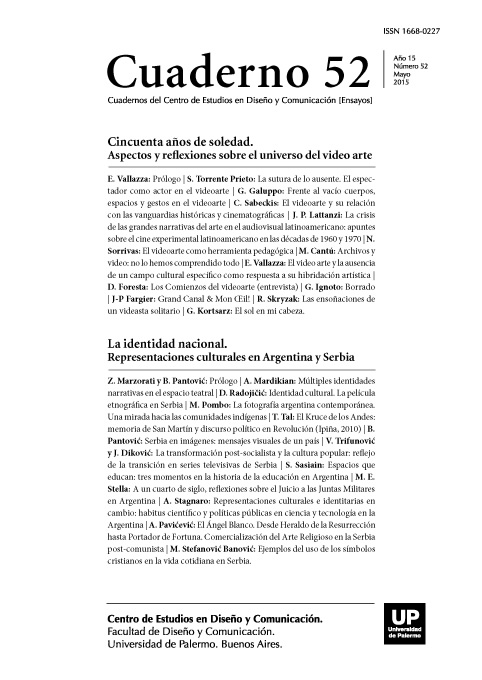La transformación post-socialista y la cultura popular: reflejo de la transición en series televisivas de Serbia
Abstract
This study aims to examine how the new social phenomenon and value orientation, which has been a result of the transition process (from 1989-to present), are reflected in the Serbian TV series production. As the particularity of the post-socialist transformation has been developed in two phases in Serbian society, we have chosen two television
series for this analysis: Srećni ljudi (Lucky People) and Mile protiv tranzicije (Milo Vs.
Transition). The first one belongs to the first transition period (1989-2000), while the
second can be placed in the context of the so-called second transition (2000 – to present).
The first case describes the beginning of the social and economic transformation, that
means the collapse of public enterprises and state signaling its privatization and the emergence of private employers. On the other hand, the second case makes a parody of how
the extensive conglomeration of certain political and social relations have changed and
the values that represent the transition indicators (establishment of liberal democracy, political correctness, the multiplication of NGOs , integration into the EU). We decided to
analyze TV series becuse them describe several different phases of the entire period of the
post-Socialist transformation. Focusing on this, we believe that we can analyze how they
reflect and presents the key consequences of different phases of the transition in one of the
most important media of popular culture today.
References
A. A. Šta nam znači EU. Politika, (Decembar 27, 2009).
AGB Nielsen Media Research: http://agbnmr.com/whereweare/dynPage.asp?lang=local&id=354&country=Serbia
Antonić, Slobodan. (2004). Društvena osnova i sadašnji pokušaj modernizacije. In: Anđelka Milić (ed.), Društvena transformacija i strategije društvenih grupa: svakodnevica Srbije na početku milenijuma. Beograd: Institut za sociološka istraživanja Filozofskog fakulteta.
Backes, Uwe and Patrick Moreau. (2008). Communist and Post-Communist Parties in Europe.
Gottingen: Vandenhoeck and Ruprecht.
Cawelti, J. G. (1969). The Concept of Formula in the Study of Popular Culture. Journal of Popular Culture, Vol. 3, No. 3, 381 – 390.
Đurković, M. (2005). Prva Petoletka: Domaće televizijske serije i transformacija sistema vrednosti u tranziciji. Sociološki pregled, Vol.XXXIX, No.4, Institut za evropske studije, 357-381.
Fiske, J. (2001). Television Culture. Taylor & Francis e-Library.
Jordan, M. (1981). Realism and Convention. In: R. Dyer, C. Geraghty, M. Jordan, T. Lovell, R. Paterson and J. Stewart (eds.), Coronation Street. London: British Film Institute, 27-39.
Kopecky, P. and Cas Mudde. (2002). The Two Sides of Euroscepticism Party Positions on European Integration in East Central Europe. European Union Politics, Vol. 3. London: Sage Publications. 297–326.
Kovačević, I. (2006). Tranziciona legenda o dobitnicima. Etnoantropološki problemi. Vol. 1, Sv. 2, 11-25.
Lazić, J. (January 27, 2005). Intervju - Zoran Cvijanović: Espreso bato. Vreme, 734. Retrieved August 20, 2011 from http://www.vreme.com/cms/view.php?id=404318
Lazić, Mladen. Cvejić, Slobodan. (2004). Promene društvene strukture u Srbiji: slučaj blokirane post-socijalističke transformacije. In: Anđelka Milić (ed.), Društvena transformacija i strategije društvenih grupa: svakodnevica Srbije na početku trećeg milenijuma. Beograd: Institut za sociološka istraživanja Filozofskog fakulteta, 39-70.
Lohof, B. A. (1972). Popular Culture: The Journal and the State of the Study. Journal of Popular Culture, Vol. 6, No. 3, 453 – 462.
Matić, M. (2007). Privatno preduzetništvo u savremenoj Srbiji. Antropologija, No. 3, 86-96.
McLuhan, M. (1994). Understanding Media: The Extensions of Man, Boston: The MIT Press, MA (Reprint Edition).
Milosavljević, Dragan. (2005). Mile, tranzicija. Manipulacija: Kriva ogledala Teofila Pančića. Nova srpska politička misao. No. 106. Retrieved August 20, 2011 from http://www.starisajt.nspm.rs/komentari2005/2005_dm_mile_1.htm
Mihailović, Srećko. (2010). Priča o tranziciji ili naracija o našim beskrajnim menama. In: Kako građani Srbije vide tranziciju. Istraživanje javnog mnenja tranzicije. Službeni glasnik. 7-29.
Naumović, Slobodan. (2006). On the Heaviness of Feathers, or What Has Culture Got to do With the Failure to Establish an Organic Poultry Production Business in Contemporary Serbia? Etnoantropološki problemi, Vol.1, No. 1, 103-124.
Pančić, T. (Januar 15, 2004). Mile sa Čubure u Vladi. Vreme, 680. Retrieved August 20, 2011 from http://www.vreme.com/cms/view.php?id=364193 Mile protiv tranzicije - koplje u trnje: Nacionalna klasa. Vreme, 734, Januar 27, 2005.
Retrieved August 20, 2011 from http://www.vreme.com/cms/view.php?id=404318
Ristić, I. (2008). The Socialist Party of Serbia”. Uwe Backes and Patrick Moreau (eds.) Communist and Post-Communist Parties in Europe. Gottingen: Vandenhoeck and Ruprecht. 343-371.
Spitulnik, D. (1993). Anthropology and Mass Media, Annual Review of Anthropology, Vol. 22, 293 – 315.
Taggart, P. and Szczerbiak, A. (2002). The Party Politics of Euroscepticism in EU Member and Candidate States. SEI Working Paper No 51 (also Opposing Europe Research Network Working Paper No 6) Sussex: Sussex European Institute.
Verdery, K. (1998). Transnationalism, Nationalism, Citizenship, and Property: Eastern Europe Since 1989. In: American Ethnologist. Vol. 25, No. 2. Blackwell Publishing. 291- 306
Zivkovic, M. (2007). Mile vs Transition - a Perfect Informant in the Slushy Swamp of Serbian Politics. Social Identities, Vol. 13, No. 5. Routledge, 597-610.
Žikić, Bojan. (2010). Antropološko proučavanje popularne culture. Etnoantropološki problemi, Vol. 5, No. 2, 17-39.
(2007). Ljudi (koji nisu sasvim) kao mi. Kulturna konceptualizacija pojma privatnik u Srbiji. In: Vladimir Ribić (ed.) Antropologija postsocijalizma, Beograd: Odeljenje za etnologiju i antropologiju Filozofskog fakulteta i Srpski genealoški centar, Etnološka biblioteka knj. 34, 52-74.
Los autores/as que publiquen en esta revista ceden los derechos de autor y de publicación a "Cuadernos del Centro de Estudios de Diseño y Comunicación", Aceptando el registro de su trabajo bajo una licencia de atribución de Creative Commons, que permite a terceros utilizar lo publicado siempre que de el crédito pertinente a los autores y a esta revista.


